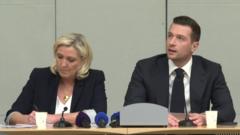In a significant ruling, France's Cour de Cassation has upheld the corruption conviction of Nicolas Sarkozy, leading to the enforcement of an electronic monitoring measure for a duration of one year.
Nicolas Sarkozy's Corruption Conviction Upheld by France's Highest Court

Nicolas Sarkozy's Corruption Conviction Upheld by France's Highest Court
The former French president will now be subjected to electronic monitoring following the rejection of his appeal.
Former French President Nicolas Sarkozy's legal battle has reached a crucial turning point as France's highest court recently affirmed his conviction for corruption. The ruling by the Cour de Cassation confirms Sarkozy's punishment and mandates that he wear an electronic monitoring bracelet for one year.
Sarkozy, who served as president from 2007 to 2012 and is now 69 years old, expressed his discontent with the verdict, labeling it a "profound injustice" and indicating plans to escalate the matter to the European Court of Human Rights.
Initially sentenced to three years in prison in 2021, Sarkozy received a reprieve with two years suspended and the remaining year to be served under electronic supervision, rather than in prison. His conviction arose from actions taken in 2014, where he attempted to bribe a judge by pledging help in securing a prestigious job in exchange for insider information regarding a distinct case.
The original sentence, delivered by Judge Christine Mée, emphasized that Sarkozy was aware of the wrongful nature of his actions, which, together with his lawyer's involvement, tarnished the public perception of justice in France. The charges included influence-peddling and violation of professional confidentiality.
Sarkozy's attorney, Patrice Spinosi, assured that his client would adhere to the court's ruling, but also noted that Sarkozy's appeal options within France have been exhausted.
The case represents a notable moment in French legal history, as the conviction of Sarkozy marks one of the rare instances post-World War II where a former president faces criminal punishment. The only similar case was that of Jacques Chirac, Sarkozy's predecessor, who received a suspended sentence in 2011 for creating fictitious jobs for political allies while acting as the mayor of Paris.
Sarkozy, who served as president from 2007 to 2012 and is now 69 years old, expressed his discontent with the verdict, labeling it a "profound injustice" and indicating plans to escalate the matter to the European Court of Human Rights.
Initially sentenced to three years in prison in 2021, Sarkozy received a reprieve with two years suspended and the remaining year to be served under electronic supervision, rather than in prison. His conviction arose from actions taken in 2014, where he attempted to bribe a judge by pledging help in securing a prestigious job in exchange for insider information regarding a distinct case.
The original sentence, delivered by Judge Christine Mée, emphasized that Sarkozy was aware of the wrongful nature of his actions, which, together with his lawyer's involvement, tarnished the public perception of justice in France. The charges included influence-peddling and violation of professional confidentiality.
Sarkozy's attorney, Patrice Spinosi, assured that his client would adhere to the court's ruling, but also noted that Sarkozy's appeal options within France have been exhausted.
The case represents a notable moment in French legal history, as the conviction of Sarkozy marks one of the rare instances post-World War II where a former president faces criminal punishment. The only similar case was that of Jacques Chirac, Sarkozy's predecessor, who received a suspended sentence in 2011 for creating fictitious jobs for political allies while acting as the mayor of Paris.


















